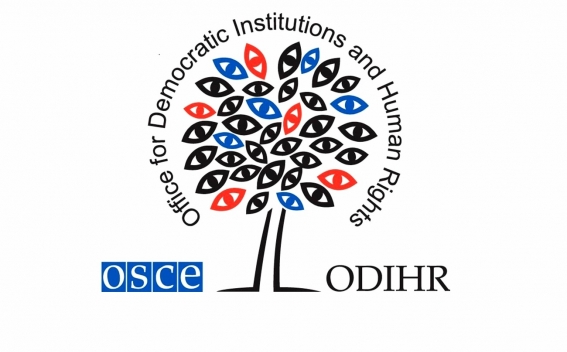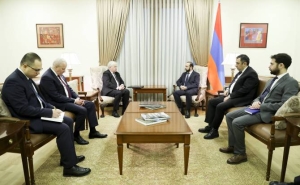 OSCE/ODIHR Interim Reports on Armenia's and the EaP Countries' General Elections: Comparative Analysis
OSCE/ODIHR Interim Reports on Armenia's and the EaP Countries' General Elections: Comparative Analysis

In order to evaluate the European integration processes of the Republic of Armenia and compare the quality of the election processes with other countries of the region, "Armedia" IAA presents a comparative analysis of the preliminary reports on the general elections in Moldova and Georgia, i.e. the Eastern Partnership countries (1st round of the presidential elections in Moldova was held on 30.10.2016, 1st round of parliamentary elections in Georgia - on 08.10.2016).
It should be noted that the statement on preliminary circumstances and conclusions is the result of joint activities of the OSCE Office for Democratic Institutions and Human Rights (OSCE/ODIHR), the OSCE Parliamentary Assembly (OSCPA), the Parliamentary Assembly of the Council of Europe (PACE) and the European Parliament (EP). The evaluation was carried out to find out whether the elections meet the criteria of the OSCE, the Council of Europe and other international organizations.
Below is a comparative analysis.
General comparison
As in case of Moldova, Georgia and Armenia, preliminary assessments refer to respect for the fundamental freedoms of people, but if in case of Armenia and Georgia it is said that the main freedoms were "mostly" respected, in case of Moldova, the notion of "mostly" is absent. In case of Georgia and Armenia, it was said about well-organized elections, which is not mentioned in the assessments for Moldova. Instead, the elections held in Georgia and Moldova are considered as "competitivl", which is not the case for Armenia. In case of Armenia, as obstacles to the election, vote-buying, the pressure on public servants and employees of private companies, and the general lack of public confidence towards elections are mentioned. The report on Georgia refers to illegal propaganda and some incidents related to the use of violence, and in Moldova, the abuse of the administrative resources, as well as unbalanced coverage of the election campaign by the media.
Organization of elections
The interim reports on both Georgia and Armenia state that the Central Election Commission (CEC) acted transparently. In case of Moldova, it is noted that, despite the existence of a climate of mistrust in state institutions, the interlocutors of OSCE/ODIHR mostly trust the impartiality of the CEC, as well as lower-level electoral bodies. According to the report, the CEC of Moldova acted openly, in certain legal terms. In case of Georgia, the lack of clarity refers to the uncertainty of the legal category of electing the members of precinct election commissions (PECs), which gives rise to misinterpretation and causes concerns. In addition, it is said that the bias in the process of appointing members of commissions were at lower levels. In case of Armenia, there is also a reference to the bias in the PEC; the report also notes that the CEC was not consistent with complaints. In case of Moldova, although it is said that the technical aspects of elections were carried out professionally at all levels, nevertheless, certain decisions of the CEC were not clear and did not complicate certain aspects of the process.
Election campaign
In the reports on Moldova and Georgia, the election campaign was judged as controversial, in case of Armenia, such a definition is not available. In case of Armenia, it is noted that the rivals in general, although they were able to carry out the election campaign without restrictions, nevertheless, certain cases of violence were recorded in certain parts of the country. Individual cases of violence are also mentioned in the report on Georgia. The reports of all three countries refer to the use of administrative resources in election campaigns. As a positive example in the case of Armenia, it was said that many officials took leave to participate in the election campaign. As a negative side of the election campaign in Moldova, it is said that the registration of candidates was inconsistent, which had a negative impact on the equal opportunities of rivals. In case of Georgia, the confrontational positions of the two leading parties is mentioned as a drawback, which influenced the atmosphere of the elections. In case of Armenia, there is a talk of vote-buying, of pressure exerted on public servants, which has led to a lack of public confidence in the election processes.
Information coverage
The reports on elections in Armenia and Georgia emphasize the fact that the current legislative field guarantees media freedom. In case of Moldova, it is noted that the media is tightly linked to major political parties, which reduces political pluralism on television. In case of Georgia, it also says that generally the media is polarized; at the same time it is noted that, on the whole, the level of pluralism in the country has increased. In the case of Armenia, it is emphasized that freedom of broadcasting media companies is limited to editorial interference. The reports on Georgia and Moldova also mention a noticeable partiality of the broadcasting media companies. In case of Armenia, it is stressed that there is no interference in the network freedom, and the Internet has contributed to the growth of political pluralism in the information field. In addition, it is noted that the Public Television evenly covered the opponents. In case of Georgia, it is stressed that, through debates, rivals have received a comprehensive and pluralistic platform for expressing their opinions. In case of Moldova, it is noted that it was not possible to achieve fair, balanced and impartial coverage of candidates' election campaigns.
Appeals and complaint
As for the elections in Moldova and Georgia, reports indicate that appeals and complaints were addressed in a transparent way. Unlike Moldova, in case of Georgia, it is stressed that the absence of accelerated deadlines for the application of administrative measures against violations in elections, as well as the lack of resources for investigations limited the effectiveness of the process. In case of Moldova, as a problem was mentioned that the inconsistent interpretation of the law related to the withdrawal of candidates from registration has reduced the general credibility of the electoral bodies and the judiciary. In the case of Armenia, there is a talk of an existing lack of trust in the system of complaint solutions, as well as the lack of independence of the judiciary, electoral and law enforcement bodies. In case of Georgia, it is noted that many stakeholders stressed the need to continue reforms in the judicial system.
Other materials on this subject
- RA President: Armenia Has No Longer Individual-Centered Government Our people witnessed the advantage of it, after the election, when for the first time in the history people did not gather and say they would make a revolution.
- The New Parliament Will Carry Out Multi-Vector and Balanced Foreign Policy In regard with Karabakh conflict, the new Parliament will have a joint approach – to resolve the conflict through peaceful negotiations. Nevertheless, in the approaches of the 4 political forces there...
- Post-Election Armenia: Changes Are Recorded in the Political Culture These elections were obsereved by an unprecedented number of observers, including both international observers and local ones, as well as our compatriots from Diaspora. This means that more representatives...
- Only 1.65% of the Armenian Voters Expressed Themselves in Favor of Great Concessions on Karabakh Issue It should be mentioned that the least votes received the approach adopted by "Congress-PPA" party, which supposed great concessions. Instead, the voters supported the settlement of the conflict with negotiations...
- What Relations with the Diaspora Did the RA Citizens Choose? Armenian Revolutionary Federation, which received 103,48 votes, thinks that the Armenian Diaspora should be fully integrated in the development of Armenian statehood.
-
 17:08
17:08The regular session of the Anti-corruption Policy Council takes place in Jermuk
-
 15:05
15:05The Prime Minister sends congratulatory messages to the supreme leader of Iran and the President of Iran
-
 11:11
11:11Armenia sends earthquake aid to Turkey
-
 10:43
10:43Commemoration of the Pontiff St. Sahak Partev
-
 09:16
09:16Some roads are closed and difficult to pass in Armenia
-
 19:55
19:55Phone conversation of the Foreign Minister of Armenia with the U.S. Assistant Secretary of State for European and Eurasian Affairs
-
 18:30
18:30Prime Minister Pashinyan and President Khachaturyan meet
-
 18:20
18:20Ararat Mirzoyan with Co-Chairman of the OSCE Minsk Group of France Brice Roquefeuil
-
 17:01
17:01Humans could land on Mars within 10 years, Musk predicts
-
 16:45
16:45France, US urge 'immediate' end to Nagorno Karabakh blockade
-
 16:01
16:01Blockaded Nagorno Karabakh launches fundraiser to support quake-hit Syria
-
 15:59
15:59Earthquake death toll in Turkey rises to 18,342
-
 15:43
15:43Ararat Mirzoyan Held a Telephone Conversation with Sergey Lavrov
-
 15:06
15:06French president rules out fighter jet supplies to Ukraine in near future
-
 14:47
14:475 Day Weather Forecast in Armenia
-
 14:44
14:44President Vahagn Khachaturyan wrote a note in the book of condolences opened in the Embassy of Syria in Armenia
-
 14:20
14:20Azerbaijan’s provocations impede establishment of peace and stability – Armenian FM tells Russian Co-Chair of OSCE MG
-
 12:57
12:57France representation to OSCE: Paris calls on Azerbaijan to restore freedom of movement through Lachin corridor
-
 11:40
11:40Command of Kosovo forces highly appreciated preparation of Armenian peacekeepers
-
 10:16
10:16The United States withdrew from sanctions against Syria for six months the provision of assistance after the earthquake
day
week
month
Humidity: %
Wind: km/h









